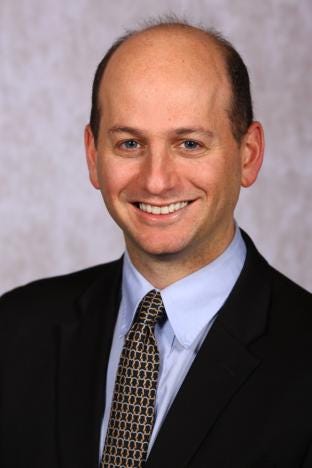Optum introduces browser-based course on Active Surveillance, Prostate Cancer, and PSA
Why not give Prostate Watch Academy spin?
By Howard Wolinsky
Optum Health, the Eden Prairie, Minnesota-based network of clinicians and physicians, has just launched a new online “browser course” to help Optum Health patients and the rest of us understand prostate cancer screening, biopsies, and Active Surveillance.
The free program, Prostate Watch Academy, which requires registration, is available at https://prostatewatch.thebigknow.com/home.
It is worth checking out, especially for those starting on PSA blood tests, those facing biopsies, and those making prostate cancer management decisions about Active Surveillance or close monitoring vs. aggressive treatment.
The course has a strong pro-AS message but shares the pros and cons of all options.
Prostate Watch Academy is a web-based browser course for desktops, phones, and tablets. It will be translated into Spanish around mid-August.
“The goal is twofold: Increase guideline-concordant screening and increase active surveillance for patients with low-risk cancers, primarily via the route of increasing awareness about AS as an option before a cancer diagnosis,” said Dr. Ken Cohen, Executive Director of Translational Research at Optum
(Dr. Ken Cohen, Optum)
“The full course is targeted for patients (primarily Optum Patients) that are being referred for a biopsy. Many individuals will go through the material and never have a cancer diagnosis. With that in mind, the course is also intended to help patients learn about key terminology and what to expect, as well as suggested questions to ask at their appointments. Also, as long as the course is hosted, individuals can return to the material, including after meeting with their clinician.”
The course offers an introduction to prostate cancer and screening.
Dr. Reed V. Tuckson, a Washington, D.C.-based family physician, is a calming Dr. Welby-like presence as the narrator who leads this “crash course” in prostate cancer. He explains the options for patients with low-risk disease, including Active Surveillance.
(Dr. Reed Tuckson.)
Tuckson is the author of “The Doctor in the Mirror” and is the former Chief of Medical Affairs for United Health Group. He is now the managing director of Tuckson Health Connections, LLC, a non-profit focused on improving health and healthcare throughout America.
“These decisions [about screening} are highly personal based on your age, your health, your risk, your values, your preferences, and more. So we're going to do just that. I'm going to help you understand how prostate cancer screening works and what your management options might be if you are diagnosed, including the preferred option for low-risk prostate cancer known as active surveillance. Many of you watching this will never need to think about a care decision for prostate cancer,” Tuckson says.
“Even if you undergo a prostate biopsy, it may have no sign of cancer. So why even think about a care decision or watch this video if you don't even have cancer? Because research shows that being informed beforehand allows patients to make better, more personalized care decisions that's best for them. Ultimately, my goal as a doctor is to help you take charge of your health and health care. By helping you better understand prostate cancer screening, management options, and by offering you strategies for discussing these things with your doctor, I'm hopeful we can do just that.”
The course highlights AS: https://prostatewatch.thebigknow.com/courses/prostate-cancer/lessons/prostate-cancer-lesson5 as a management option.
“If you have low-risk cancer, which the majority of prostate cancers are, the recommended care path is active surveillance. This lesson explains how active surveillance works and why it might be the best option for patients with low-risk prostate cancer,” Tuckson notes.
Patients are expected to skip around the program.
The course, produced by mPulse Mobile, offers downloadable lists of questions to bring to the doctor.
Check out:
—Questions to ask about “suspicious” test scores: https://s3.amazonaws.com/files.thebigknow.com/argon/OptumLabs/ProstateWatch/Lesson-2/Questions+to+Ask+about+Suspicious+Screening+Results.pdf
—Questions to ask about biopsies:
https://s3.amazonaws.com/files.thebigknow.com/argon/OptumLabs/ProstateWatch/Lesson-3/Questions+to+Ask+About+Biopsy+Procedure.pdf
Tips and links are scattered around the browser course.
There are some great insights from patients. Listen to some here from Anthony Henry, Bill Manning and Jim-Bob Williams. Check here: https://prostatewatch.thebigknow.com/courses/prostate-cancer/lessons/prostate-cancer-lesson5/parts/1/slides/1 Ken Mason also offers reassurance.
(Anthony Henry, of the Walnut Foundation)
(Bill Manning, of Active Surveillance Patients International.)
There is special advice addressing the GLBTQ community.
The course features a link to “My Cancer Journey,” a blog I have written for MedPage Today since 2016: https://www.medpagetoday.com/special-reports/apatientsjourney and also to TheActiveSurveillor.com.
I’m still in the process of taking the course. I didn’t see it before it was launched though I was a consultant along with Dr. Scott Eggener, the AS expert at UChicago, who placed me on AS 13 years ago.
What I have seen so far is informative and patient-friendly. I recommend it for those facing choices about PSA screening, biopsies, and management approaches (AS vs. more aggressive ones), and anyone who wants a refresher.
Add Prostate Watch to Active Surveillance 101 (https://aspatients.org/a-s-101/) to your streaming curricula.
Genomics guru Dr. Todd Morgan holding AnCan webinar July 31
By Howard Wolinsky
Todd Morgan, MD, Chief of the Division of Urologic Oncology at the University of Michigan, is presenting a webinar for the AnCan Foundation at 8-9:30 p.m. July 31 entitled “How and why PCa genomic tests work ... What's Inside the Black Box?"
To register, go to: https://attendee.gotowebinar.com/register/2818379687157097308
The program is aimed at the full spectrum of patients with prostate cancer, from low-risk to high-risk.
Morgan will cover the difference between inherited and somatic testing, who should undergo genomic testing, and his upcoming randomized trial comparing the leading genomic tests, Decipher, Prolaris, and Oncotype DX.
Please send your questions, comments and feedback to: joeg@ancan.org
(Dr. Todd Morgan, Michigan Medicine. Go Blue!)
Morgan has served on several national guideline committees, including the American Urological Association's Advanced Prostate Cancer Guidelines, the National Comprehensive Cancer Network's Prostate Cancer Early Detection Guidelines, the American Society for Clinical Oncology's Localized Prostate Cancer Guidelines, and the ASCO Molecular Markers for Prostate Cancer Guidelines.
Still time to sign up for “Pissed The Many Ways Urination Can Go Wrong’
By Howard Wolinsky
Listen up, UriNation.
Dean Elterman, MD, an academic urologist at the University of Toronto, is presenting a free webinar, “Pissed Off: The Many Ways Urination Can Go Wrong” to Active Surveillance Patients International at 12-1:30 p.m. Eastern on Saturday, July 1, 2023.
Click here to register: https://tinyurl.com/5d7ypd8k
He’ll cover the waterfront of topics, from BPH to incontinence to overactive bladder.
The session will be followed with a live Q&A.
(Dean Elterman, MD, University of Toronto.)
Elterman’s research interests include voiding dysfunction, benign prostate enlargement, and men’s health.
He is the medical director of the Prostate Cancer Rehabilitation Clinic at Princess Margaret Cancer Centre in Toronto.









Sorry. I have not written about recurrence of PSA.
Howard, have yet to read this edition but question: Have you indexed newsletters such that on a topic, say reoccurrence-PSA 15-specific editions referenced?